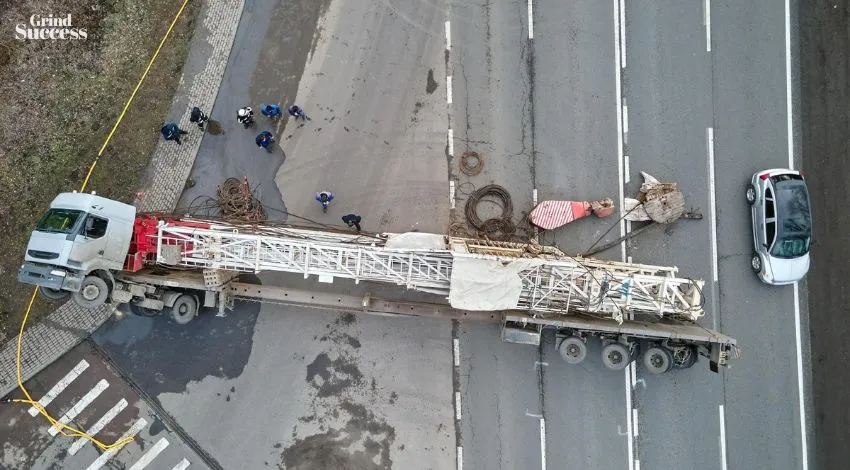Strategic Planning for the Worst-Case Scenario: Truck Accidents and Sarasota Business Continuity

In the bustling streets of Sarasota, where the hum of commerce meets the roar of truck engines, the thought of a road accident is an unsettling specter for any entrepreneur.
The truth is, these incidents strike with little warning, and the fallout can ripple through both the personal and professional realms, often with devastating effects. It’s not just the immediate trauma but the long-term ramifications that can derail an entrepreneur’s hard-earned progress.
This reality brings to light the critical need for strategic planning, ensuring that both personal well-being and business continuity are preserved in the wake of such unforeseen events.
In a city crisscrossed with truck routes, legal preparedness becomes a cornerstone of this strategy. Securing the right legal support is not just about responding to accidents, it’s a proactive step in safeguarding you in your entrepreneurial journey against the chances of the road.
Understanding the Risks
Truck accidents are not just statistics; they are real events with the potential to cause significant disruption.
In Sarasota, and across Florida, the growing number of trucks on the road has paralleled an increase in accident rates. These incidents can range from minor fender benders to severe collisions resulting in major injuries or even fatalities.
For an entrepreneur, the risks extend beyond personal injury; there’s the threat to the operational flow of a business, the loss of critical work time, and the possible damage to essential equipment or products.
The direct costs such as medical bills and vehicle repairs are often compounded by indirect costs like lost business opportunities and prolonged legal battles. These factors can culminate in a financial strain that many businesses, especially small enterprises, are ill-prepared to manage.
Understanding these risks is the first step in crafting a defense against the chaos that a truck accident can unleash on an entrepreneur’s life and livelihood.
Florida and Sarasota Trucking Accident Statistics
Florida’s bustling highways and busy city streets see a substantial amount of commercial truck traffic, a testament to the state’s vibrant economy. However, with this economic benefit comes the increased risk of truck-related accidents.
In Florida, the frequency of truck accidents has been a growing concern, with statistics from the Florida Department of Highway Safety and Motor Vehicles (FLHSMV) indicating that there are thousands of truck accidents each year, many of which result in significant injuries and fatalities.
Sarasota, with its mix of local and tourist traffic, is not immune to this trend. The area has seen its share of trucking accidents, particularly on major routes such as Interstate 75 and the bustling corridors leading to the Port of Sarasota. These accidents often involve not just other vehicles but also pedestrians and cyclists, highlighting the diverse risk profile in such an urban setting.
According to the FLHSMV, Sarasota County alone experiences hundreds of truck accidents annually, with a percentage resulting in serious injuries. The nature of injuries can range from minor bruises to more severe outcomes like traumatic brain injuries, spinal cord damage, and, in unfortunate cases, fatalities.
The statistics also reveal that such incidents tend to spike during high-traffic periods, underscoring the relationship between traffic density and accident rates. The impact of these accidents extends beyond physical harm.
Economically, they can cause substantial delays, not to mention the costs associated with medical care, vehicle repairs, and insurance claims. For those involved in these collisions, the road to recovery can be long and fraught with challenges, including navigating the legal complexities that come with seeking compensation.
Sarasota’s accident statistics also shed light on common contributing factors, such as driver fatigue, distracted driving, and inadequate vehicle maintenance. These factors point to preventable causes, suggesting that more stringent safety measures and enforcement could mitigate the number of incidents.
The data further indicates that commercial trucks are not the only contributors to these figures. Smaller commercial vehicles, such as delivery vans and utility trucks, also account for a share of the accidents.
This diversity in vehicle types involved in collisions adds another layer of complexity to the post-accident processes, from insurance claims to legal proceedings.
Given these statistics, it’s evident that for Sarasota residents and visitors alike, understanding the risks and knowing what steps to take in the aftermath of an accident can make a significant difference.
Legal expertise becomes invaluable in such circumstances, with truck accident lawyers playing a critical role in helping accident victims navigate the aftermath, from insurance negotiations to litigation, if necessary.
Elements of a Comprehensive Contingency Plan
A contingency plan is a proactive blueprint designed to prepare businesses for unexpected events that could interrupt normal operations.
For business owners, the value of such a plan lies in its ability to provide a structured response to crises, minimizing the impact on both short-term functions and long-term viability. It’s a vital component of any business strategy, acting as a safety net that can mean the difference between a swift recovery and a prolonged struggle.
The anatomy of a comprehensive contingency plan is multifaceted, encompassing:
Each component must be tailored to the business’s unique needs and scale. A small startup might require a simple, straightforward plan that focuses on the most essential functions, while a larger corporation may need a complex strategy that covers multiple scenarios and involves various teams and departments.
Implementing a contingency plan involves:
Tailoring these plans to individual business models ensures that when the unexpected strikes, the business is ready to act, not react.
Legal Protection and Planning
In the realm of contingency planning, deciding to include legal protection is a strategic move for any business owner.
At the forefront of this legal shield is the Sarasota truck accident lawyer, a knowledgeable attorney who plays a pivotal role in pre-emptive planning. Even before any mishap occurs, these lawyers can fortify a business against potential legal storms.
A truck accident lawyer’s role extends to crafting legal safeguards tailored to a company’s specific needs. This might include reviewing or drafting contracts with insurance companies to ensure adequate coverage for different types of truck-related incidents.
They can also help in setting up liability clauses in agreements with partners or clients, mitigating the risk of legal complications should an accident occur. The moment an accident happens, a truck accident lawyer becomes an indispensable navigator through the aftermath.
Insurance claims can be a labyrinthine process, fraught with complex negotiations and fine print that only seasoned legal eyes can interpret accurately. Liability issues, particularly determining fault in the chaotic aftermath of a truck accident.
It can be contentious and require a lawyer’s insight to protect the business’s interests should matters escalate to litigation, having a lawyer already acquainted with the business’s operations can expedite a defense strategy, saving precious time and resources. Their role isn’t just reactive; it’s also about prevention and preparation.
By conducting regular legal audits, they can identify areas where the business may be vulnerable and suggest improvements. With their guidance, entrepreneurs can navigate the intricacies of compliance with transportation laws, workplace safety regulations, and other legal requirements that impact business continuity.
In essence, integrating a truck accident lawyer into contingency planning is not an overcaution but a necessary buffer against the unpredictable.
Their involvement ensures that, should an accident strike, the legal aspects of recovery are not left to chance, allowing the business owner to focus on steering the company back to smooth operations.
Implementing Your Contingency Plan
Putting a contingency plan into practice is not a one-off task but a dynamic process that requires regular attention and updating. Begin by sharing the plan with your team and ensuring everyone understands their role.
Regular training sessions are crucial; they help staff stay prepared and can reveal aspects of the plan that may need fine-tuning. Conducting regular drills simulates the pressures of an actual emergency, providing a practical test for your plan’s effectiveness.
These drills can range from tabletop exercises to full-scale simulations, depending on the size and nature of your business.
Another key aspect is the continuous review of your insurance policies. As your business grows and changes, so do your insurance needs. Make sure your policies are up to date and provide adequate coverage for new risks. Involve your insurance agent in these reviews to help identify any gaps in coverage.
Equally important is the relationship with a truck accident lawyer. Establish this partnership early, so they become familiar with your business operations and can tailor their advice accordingly.
This relationship ensures that legal help is readily available when you need it, without the delays that come with searching for a lawyer after an incident has already occurred.
Recovering and Moving Forward
The aftermath of an accident is a critical time for both the individual and the business. Recovery is not just about healing physically but also about rebuilding operations and confidence.
Begin by assessing the incident’s impact on your business and identifying the necessary steps to resume full operations. This might involve temporary solutions, like outsourcing certain functions or finding alternative delivery methods.
Restoring growth momentum requires a clear communication strategy to reassure clients, partners, and stakeholders of your business’s resilience. Share your recovery plans and progress openly, and don’t shy away from seeking external support if needed.
Legal advice remains a cornerstone throughout the recovery phase. A truck accident lawyer can handle claims and negotiations on your behalf, allowing you to focus on the operational side of recovery.
Their expertise can also help you understand any new legal considerations that might arise from the accident, ensuring that your business is not only recovering but also adapting to a post-incident reality. This legal guidance is essential for complete recovery and helps establish a foundation for future protection and resilience.






